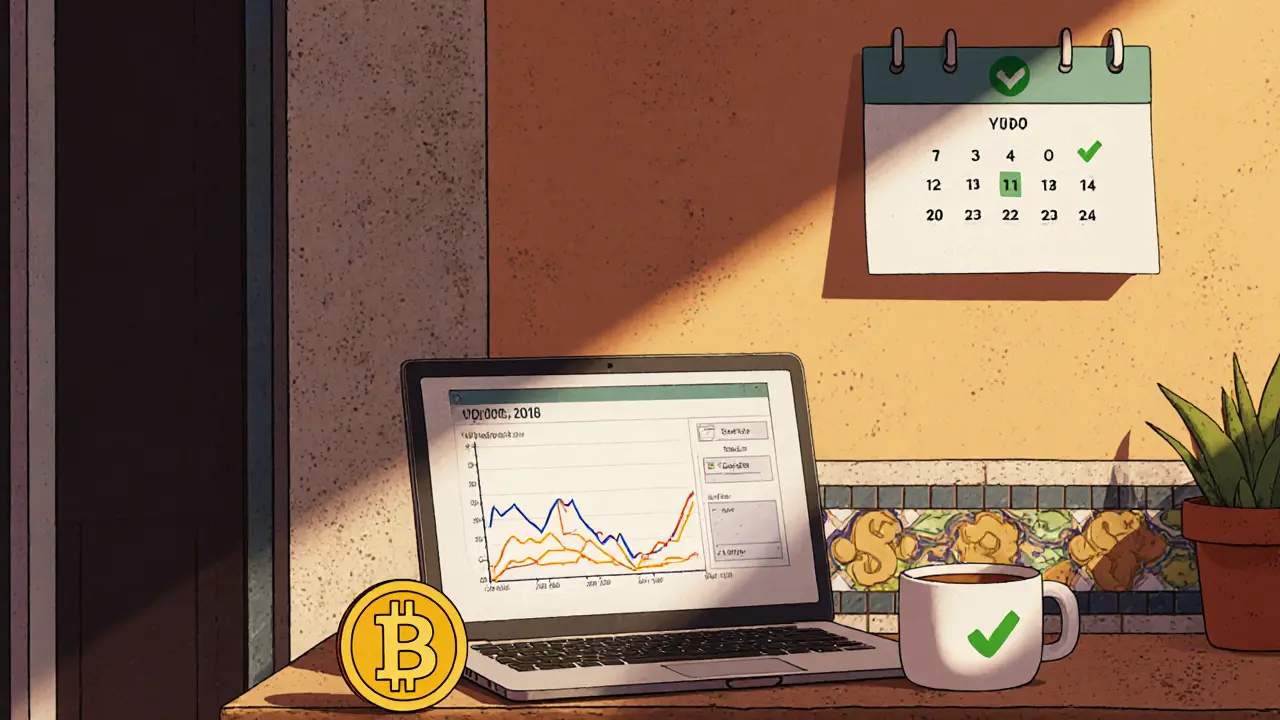Portugal Crypto Tax Benefits for Bitcoin Investors in 2025
 May, 26 2025
May, 26 2025
Portugal Bitcoin Tax Calculator
How This Calculator Works
Calculates your capital gains tax in Portugal based on holding period and transaction type.
- 365+ days = 0% tax (tax-free)
- Less than 365 days = 28% tax on gains
- Professional trading faces progressive rates up to 53%
Please enter all required information
Enter dates and amounts to calculate your tax
Portugal has quietly become one of the most attractive places in Europe to hold Bitcoin-not because of flashy headlines, but because of a simple, powerful rule: if you hold Bitcoin for more than a year, you pay zero tax on your gains. That’s not a rumor. It’s the law. And as of 2025, it’s still standing strong.
How Portugal’s Crypto Tax System Actually Works
Portugal doesn’t treat all Bitcoin activity the same. The tax code splits it into three clear buckets, and your tax bill depends entirely on which one you fall into.- Category G (Capital Gains): This is for regular investors who buy and sell Bitcoin. If you hold it for 365 days or longer, your profit is completely tax-free. No declaration needed. No paperwork. Just keep your purchase date and sell date logged. But if you sell within a year? Then you pay a flat 28% on your profit. That’s it. No deductions, no brackets, no surprises.
- Category E (Capital Income): This covers passive income like staking rewards, lending interest, or airdrops. All of it is taxed at 28%, no matter how much you earn. But here’s the catch-there’s no withholding tax. You pay it yourself when you file your annual tax return. No bank or exchange takes it out for you.
- Category B (Self-Employment Income): If you’re trading Bitcoin like a business-buying and selling daily, running a mining operation, or validating transactions professionally-you’re taxed as a freelancer. Rates range from 14.5% to 53%, depending on your total income. This is where Portugal gets strict. High-volume traders pay more than in many other countries.
This structure is intentional. Portugal wants individual investors to thrive. It doesn’t want to punish people who buy Bitcoin and wait. But it also doesn’t want professional traders to avoid taxes entirely.
Why Portugal Beats Other European Countries
Compare Portugal to Germany: same one-year exemption for long-term holdings. But if you sell before a year? Germany taxes you at your personal income tax rate-which can go as high as 45%. France? A flat 30% on every crypto sale, including crypto-to-crypto trades. And in France, even staking is taxed as income, potentially at 45%.Portugal doesn’t tax crypto-to-crypto trades at all. You can swap Bitcoin for Ethereum, then for Solana, then back to Bitcoin, and never trigger a tax event. That’s huge. In most countries, every swap is a taxable sale. In Portugal? It’s just portfolio rebalancing.
Even countries like the Netherlands and Belgium tax every crypto transaction. Portugal’s 28% short-term rate is lower than most, and the long-term exemption is cleaner than anywhere else in the EU. That’s why platforms like CoinTracking and CoinLedger still call Portugal one of the most crypto-friendly countries in the world-even after the 2023 tax reforms.
What You Must Track to Stay Tax-Free
The 365-day rule sounds simple. But if you don’t track your purchase dates, you’re at risk. The Portuguese tax authority (AT) doesn’t actively monitor crypto wallets-but they can request records if you’re audited. And if you can’t prove you held Bitcoin for over a year, they’ll assume you didn’t.You need to record:
- Exact date and time of each Bitcoin purchase
- Amount bought and price paid (in EUR)
- Wallet address used
- Date and time of sale or trade
- Amount sold and value received
Many investors use tools like Koinly, CoinTracking, or CryptoTaxCalculator. These platforms sync with exchanges, auto-import trades, and generate reports formatted for Portuguese tax filings. You don’t need to be an accountant-just consistent.

Professional Traders: The Hidden Catch
If you’re trading Bitcoin every day, using leverage, running a bot, or managing funds for others-you’re likely classified as a professional trader. That means you fall under Category B. And here’s the problem: Portugal taxes business income at progressive rates up to 53%.That’s higher than Germany or Spain for high earners. So if you’re turning crypto trading into a full-time job, Portugal might not be the best fit. The tax-free long-term holding benefit doesn’t apply to you. You’re treated like a freelancer, not an investor.
Some traders try to hide their activity by splitting trades across multiple accounts or using offshore exchanges. That’s risky. Portugal is slowly building crypto tracking tools. And if you’re earning serious money, you’re on their radar.
Non-Habitual Residence and the Golden Visa Edge
Portugal doesn’t just offer tax breaks for Bitcoin-it offers a full lifestyle upgrade. The Non-Habitual Residence (NHR) program lets qualifying foreigners pay just 20% on Portuguese-sourced income and zero tax on most foreign income for ten years. Combine that with Bitcoin held for over a year? You’re effectively paying zero tax on your crypto gains.And if you’re investing €500,000 or more in Portuguese assets-including crypto-backed funds-you can qualify for the Golden Visa. That means residency, EU access, and the ability to live and work anywhere in the Schengen zone. Many crypto investors use this route to legally relocate without selling their Bitcoin.

What’s Changing in 2025?
There’s no sign Portugal will reverse its crypto-friendly stance. The 2023 reforms were meant to bring clarity, not clamp down. But the tax authority is slowly upgrading its systems. They’re working with blockchain analytics firms to trace transactions. They’ve started requesting crypto records during audits.Don’t expect a sudden tax hike. But expect more reporting requirements. The government wants to know who’s making money-not to punish, but to ensure the system stays fair. That means better documentation will become more important, not less.
Real Investor Experiences
Reddit threads from Lisbon-based Bitcoin holders show a clear pattern: people who bought in 2020 and held through 2024 paid nothing. Those who bought in 2023 and sold in 2024 paid 28%. No one complained about the 28% rate-it was predictable. But those who traded daily and got flagged as professionals? They paid 40%+ and wished they’d slowed down.Digital nomads from the UK, Germany, and Sweden are moving to Portugal specifically for the crypto tax rules. One investor from Berlin told a crypto podcast: “I sold my apartment to buy Bitcoin. I moved to Lisbon because I knew I could hold it for a year and never pay tax. I didn’t think that was possible in Europe.”
Final Advice: Don’t Overthink It
If you’re a Bitcoin investor who buys, holds, and sells occasionally? Portugal is one of the best places on Earth to do it. The rules are simple: hold for a year, pay nothing. Sell early? Pay 28%. Keep records. Use a tax tool. File your return.If you’re a professional trader? Think twice. The 53% top rate can eat your profits faster than any market crash.
Portugal didn’t become a crypto haven by accident. It was built on clarity, consistency, and fairness. And as long as those values stay, your Bitcoin will be safer here than in most places.
Is Bitcoin completely tax-free in Portugal?
No, but long-term holdings are. If you hold Bitcoin for 365 days or more, any profit from selling is tax-free. Short-term sales (under one year) are taxed at 28%. Passive income like staking is also taxed at 28%. Only professional traders face higher progressive rates up to 53%.
Do I pay tax on crypto-to-crypto trades in Portugal?
No. Swapping Bitcoin for Ethereum, Solana, or any other cryptocurrency is not a taxable event in Portugal. This is one of the biggest advantages over countries like the U.S. or Germany, where every swap triggers a capital gain. You can rebalance your portfolio freely without tax consequences.
What happens if I can’t prove when I bought my Bitcoin?
If you’re audited and can’t prove your purchase date, the Portuguese tax authority will assume you held it for less than a year. That means you’ll be taxed at 28% on the full profit. Always keep detailed records: transaction IDs, wallet addresses, timestamps, and purchase prices in EUR. Use a crypto tax tool to automate this.
Can I use the Non-Habitual Residence (NHR) program with Bitcoin?
Yes. The NHR program allows qualifying residents to pay only 20% on Portuguese-sourced income and zero tax on most foreign income-including capital gains from Bitcoin held over one year. If you’re a foreigner moving to Portugal and holding Bitcoin long-term, NHR and the crypto tax exemption work together perfectly.
Is Portugal’s crypto tax law likely to change soon?
There’s no indication of major changes in 2025. The 2023 reforms were designed to bring transparency, not to close loopholes. The government still wants to attract digital nomads and crypto investors. However, enforcement is improving. Expect more reporting requirements and better tracking tools from the tax authority-but not higher rates for individual investors.
Do I need to declare my Bitcoin holdings every year?
You only need to declare if you sold Bitcoin within the year, earned staking rewards, or are classified as a professional trader. If you held Bitcoin for over a year and didn’t earn passive income, you don’t need to report it. But keep records in case of audit.
Can I get residency in Portugal by investing in Bitcoin?
Not directly. But you can invest €500,000 or more in Portuguese assets-including crypto-backed investment funds approved by the government-and qualify for the Golden Visa. This gives you residency and access to the EU. Many investors use this route to legally live in Portugal while keeping their Bitcoin holdings.
Vijay Kumar
November 26, 2025 AT 12:13Portugal’s just letting people get rich while the rest of Europe sweats over spreadsheets. Honestly? It’s not fair. But I’m not mad - I’m inspired. If I had a time machine, I’d go back to 2017 and buy BTC with my college loan money. Now I’m stuck in India paying 30% just to move coins. The system’s rigged, but at least Portugal’s the loophole we all dream about.
Christina Oneviane
November 27, 2025 AT 11:18Oh wow, a country that doesn’t tax Bitcoin? Next they’ll tell me the moon is made of cheese and the IRS is just a friendly neighborhood librarian. 😌
Shelley Fischer
November 29, 2025 AT 07:56The Portuguese tax framework for cryptocurrency represents one of the most coherent and investor-centric regulatory models currently operational within the European Union. Unlike jurisdictions that impose arbitrary taxation on every micro-transaction, Portugal has intelligently distinguished between speculative trading and long-term capital appreciation. This distinction fosters financial responsibility while discouraging speculative excess - a rare example of policy aligning with economic reality. The absence of taxation on crypto-to-crypto swaps is particularly commendable, as it respects the fungibility and composability inherent in decentralized finance. Furthermore, the clear delineation between Category G, E, and B ensures that legitimate investors are not conflated with professional traders, thereby preserving both equity and simplicity in enforcement.
Puspendu Roy Karmakar
November 29, 2025 AT 21:20Bro, this is the real deal. I heard about Portugal last year and I just moved there. Bought BTC in 2021, held it, sold in 2024 - zero tax. Zero. No forms, no stress. Just chillin’ in Lisbon with my laptop and a coffee. If you’re thinking about it - just go. Don’t overthink. The weather’s good, the people are nice, and the government doesn’t care if you’re rich as long as you’re not scamming anyone.
Evelyn Gu
November 30, 2025 AT 23:42Okay, so I’ve been reading this whole thing like ten times because I’m trying to figure out if I can actually move there, like, for real, and I’m just so overwhelmed by how simple it sounds compared to the U.S., where if you so much as send a dollar of BTC to your friend, you get a 1099 form in the mail like you just committed tax fraud, and I’m just wondering - is it really that easy? Like, do they just not check? Do they even know what a blockchain is? I mean, I’ve seen those videos of people getting audited for crypto in California, and I’m just scared, but also… kind of hopeful? Like, what if I just… disappeared into Portugal? With my Bitcoin? And my cat? And my laptop? And… oh my god, I just cried a little thinking about it. I need to move. I need to move. I need to move.
Michael Fitzgibbon
December 2, 2025 AT 09:15I’ve watched this space for years - from the wild west of 2017 to the regulatory gray zones of 2022. Portugal’s approach feels… human. Not perfect, but thoughtful. They didn’t try to crush innovation or punish the quiet investors. They just said: ‘If you’re holding, you’re not the problem.’ And that’s rare. Most governments see crypto as a revenue stream. Portugal sees it as a lifestyle. I don’t envy the traders getting taxed at 53% - but I respect the clarity. This isn’t a loophole. It’s a philosophy.
Komal Choudhary
December 3, 2025 AT 18:22So wait, if I buy BTC in India, hold it for a year, then sell in Portugal - do I still pay zero tax? Or do I have to be a resident? I’m confused. Also, can I just move there with my crypto and not tell anyone? 😏
Tina Detelj
December 4, 2025 AT 03:42It’s beautiful, isn’t it? The way Portugal quietly carved out a sanctuary for the patient, the quiet, the ones who believe in time more than volatility. While the world screams about DeFi, NFTs, and memecoins, Portugal just… watches. And lets the long-term holders bloom. No fanfare. No press releases. Just a quiet law that says: ‘You don’t have to be a speculator to be worthy.’ It’s poetic. It’s radical. It’s the opposite of everything else. And I think - if you’re holding Bitcoin not to get rich quick, but because you believe in its soul - then Portugal is the only country that truly understands you.
Wilma Inmenzo
December 4, 2025 AT 10:04Wait… so you’re telling me the government just… doesn’t track this? That’s impossible. They’re lying. This is a trap. The EU is setting up a backdoor to seize your coins. They’re using ‘tax-free’ as bait to get you to move there, then they’ll activate the blockchain surveillance network and freeze your wallet while you’re eating pastéis de nata. And then they’ll say ‘Oh, we didn’t tax you… we just confiscated everything.’ I’ve seen the documentaries. This is how they get you. Don’t fall for it. They’re watching. They’re always watching.